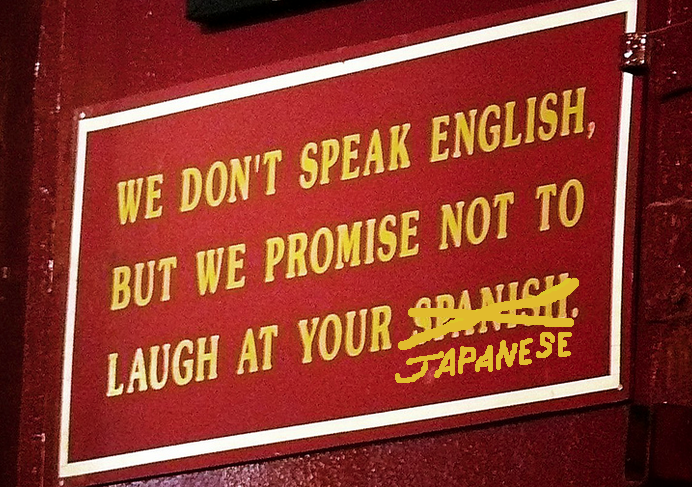
Living in a foreign country has its trials and tribulations. There are all new customs and sometimes a new language you have to learn, creating a situation that can be really frustrating and depressing. Then one day you wake up, turn on the TV and suddenly, “Huh, I kinda get what’s going on here,” and you know you’re finally ready. It’s time to speak to the locals…with confidence!
In Japan, a very interesting thing happens though. You may speak close to native level and yet the Japanese person will respond back in ENGLISH. Has this happened to you?
“How do you feel when you speak fluent or reasonably good Japanese to a Japanese person and they insist on answering you in English?” Foreigners were asked this question on Japan Today and it was shared by Madame Riri, a Japanese blogger. What do both parties have to say about this? More after the jump!
Living in Japan can be very hard. But many people who choose to do so make a great effort to fit in. They learn the language, adjust to Japanese customs that they aren’t used to, and try to make a place for their awkward selves in a society that isn’t accustomed to change. Japanese people often make it very easy because they are so polite. Sometimes though, their “over politeness” is incredibly grating.
If you’ve lived in Japan for any period of time, you will surely be familiar with the following exchange.
A: “Ohayo gozaimasu!”(Good morning!)
You: “Ohayo gozaimasu.”
A: “Nihongo jouzu desu ne!” (You are good at Japanese, aren’t you!)
It doesn’t matter if you have just stepped off the airplane, or have been living here for decades and sound like a native, Japanese people are quick to throw a compliment about your Japanese. At first it’s nice, but after a while it happens so often that you end up counting how many days in a row you can go without your language skills being complimented.
This Japan Today question certainly plays into that sense of politeness. How do you feel when you speak fluent or reasonably good Japanese to a Japanese person and they insist on answering you in English? The replies were both varied and thought provoking.

Some took slight offense to the incorrect assumption that every foreigner speaks English, but most weren’t bothered by the situation. In most cases, they thought the Japanese person was only trying to be polite and make them feel at ease. Clearly, you’ve made the effort of learning the Japanese language, but maybe the other person has also made the effort of learning English! When their English is good enough, they are only trying to make the conversation go as smooth as possible.
Some other people gave different examples, where the English used by the Japanese person revealed that their grasp of the language was not that strong. It’s easy to tell that the conversation would be easier if both parties just stuck to Japanese. In this case, most who answered the Japan Today question said they would just continue to speak in Japanese and eventually, the other party would also switch.
However, there were a couple of situations that didn’t highlight typical Japanese politeness. Some people seemed quite annoyed by the circumstances where the Japanese person speaking English was doing it in order to prove their superiority. For example, in a group situation where everyone could be speaking Japanese, one person insists on speaking in English. This leads to horribly stunted and disjointed conversations, as everyone has to spend time translating and catching up with the unnecessary English. It’s clear that the bragger is just showing off and it would be better for the group if they just spoke Japanese.

Another situation that came up is all too familiar for many of us. There are times when the Japanese person you are speaking with is just trying to practice their English with impromptu lessons. Are these people trying to assist you or do they think “free English lessons” when they see your foreign face? These interactions are much less tolerable, because you had a simple question and they want more of your time.
Madame Riri’s thoughts on the situation lean to the practical side. She hopes that Japanese people will take time to read the situation properly before responding in English or Japanese. If someone thinks that their English is at a higher level than the other person’s Japanese, it’s probably fine to answer in English. However, if the Japanese person’s English is not that great, they should really just stick to Japanese despite how badly they may want to practice their English.
The final piece of advice from Madame Riri ties in with the comments made on Japan Today. If a foreign person speaks to you in Japanese, don’t think you must speak English because they are foreign. They made the effort in Japanese, so it’s perfectly acceptable for you to speak Japanese back. Also, make sure to speak to the person talking with you, no matter how un-Asian they look.
What do you think? Have you run into a situation like this? How do you handle it? Let us know in the comments.
Source: Japan Today, Madame Riri
Top Image: Flickr (Arkangel) Edited by RocketNews24

 Five Japanese misconceptions about foreign male/Japanese female couples
Five Japanese misconceptions about foreign male/Japanese female couples Reasons why it’s harder to raise kids in Japan than in other countries…or not
Reasons why it’s harder to raise kids in Japan than in other countries…or not Why Foreign Guys in Japan Get So Many Girls
Why Foreign Guys in Japan Get So Many Girls 5 common misconceptions most westerners have about Japanese food
5 common misconceptions most westerners have about Japanese food 30 common characteristics of people who fall in love with Japan
30 common characteristics of people who fall in love with Japan Survey finds that one in five high schoolers don’t know who music legend Masaharu Fukuyama is
Survey finds that one in five high schoolers don’t know who music legend Masaharu Fukuyama is If you haven’t tried an antenna shop in Japan, you’re missing out
If you haven’t tried an antenna shop in Japan, you’re missing out What’s the best way to spend 1,000 yen at Kura Sushi?【Japan Super Budget Dining】
What’s the best way to spend 1,000 yen at Kura Sushi?【Japan Super Budget Dining】 Japanese potato chip Rubik’s Cubes coming soon
Japanese potato chip Rubik’s Cubes coming soon Godiva’s Tokyo bakery is FINALLY easy to get into and shop at
Godiva’s Tokyo bakery is FINALLY easy to get into and shop at Yakuzen ramen restaurant in Tokyo is very different to a yakuza ramen restaurant
Yakuzen ramen restaurant in Tokyo is very different to a yakuza ramen restaurant Saitama is home to the best strawberries in Japan that you’ve probably never even heard of
Saitama is home to the best strawberries in Japan that you’ve probably never even heard of Hana Komon: Japan’s beautiful, samurai-style floral birthday crests
Hana Komon: Japan’s beautiful, samurai-style floral birthday crests Get ready with Roland, the top-earning host in Japan【Video】
Get ready with Roland, the top-earning host in Japan【Video】 Super Sentai Series to end after this season
Super Sentai Series to end after this season The 10 most annoying things foreign tourists do on Japanese trains, according to locals
The 10 most annoying things foreign tourists do on Japanese trains, according to locals Starbucks Japan releases new sakura goods and drinkware for cherry blossom season 2026
Starbucks Japan releases new sakura goods and drinkware for cherry blossom season 2026 Naruto and Converse team up for new line of shinobi sneakers[Photos]
Naruto and Converse team up for new line of shinobi sneakers[Photos] Is Sapporio’s Snow Festival awesome enough to be worth visiting even if you hate the snow? [Pics]
Is Sapporio’s Snow Festival awesome enough to be worth visiting even if you hate the snow? [Pics] Japan has trams that say “sorry” while they ride around town…but why?
Japan has trams that say “sorry” while they ride around town…but why? Sakura Totoro is here to get spring started early with adorable pouches and plushies
Sakura Totoro is here to get spring started early with adorable pouches and plushies Starbucks Japan unveils new sakura Frappuccino for cherry blossom season 2026
Starbucks Japan unveils new sakura Frappuccino for cherry blossom season 2026 Poop is in full bloom at the Unko Museums for cherry blossom season
Poop is in full bloom at the Unko Museums for cherry blossom season Now is the time to visit one of Tokyo’s best off-the-beaten-path plum blossom gardens
Now is the time to visit one of Tokyo’s best off-the-beaten-path plum blossom gardens Playing Switch 2 games with just one hand is possible thanks to Japanese peripheral maker
Playing Switch 2 games with just one hand is possible thanks to Japanese peripheral maker Japan’s newest Shinkansen has no seats…or passengers [Video]
Japan’s newest Shinkansen has no seats…or passengers [Video] Foreigners accounting for over 80 percent of off-course skiers needing rescue in Japan’s Hokkaido
Foreigners accounting for over 80 percent of off-course skiers needing rescue in Japan’s Hokkaido Super-salty pizza sends six kids to the hospital in Japan, linguistics blamed
Super-salty pizza sends six kids to the hospital in Japan, linguistics blamed Foreign tourists in Japan will get free Shinkansen tickets to promote regional tourism
Foreign tourists in Japan will get free Shinkansen tickets to promote regional tourism Take a trip to Japan’s Dododo Land, the most irritating place on Earth
Take a trip to Japan’s Dododo Land, the most irritating place on Earth Archfiend Hello Kitty appears as Sanrio launches new team-up with Yu-Gi-Oh【Pics】
Archfiend Hello Kitty appears as Sanrio launches new team-up with Yu-Gi-Oh【Pics】 Survey asks foreign tourists what bothered them in Japan, more than half gave same answer
Survey asks foreign tourists what bothered them in Japan, more than half gave same answer Japan’s human washing machines will go on sale to general public, demos to be held in Tokyo
Japan’s human washing machines will go on sale to general public, demos to be held in Tokyo Starbucks Japan releases new drinkware and goods for Valentine’s Day
Starbucks Japan releases new drinkware and goods for Valentine’s Day We deeply regret going into this tunnel on our walk in the mountains of Japan
We deeply regret going into this tunnel on our walk in the mountains of Japan Studio Ghibli releases Kodama forest spirits from Princess Mononoke to light up your home
Studio Ghibli releases Kodama forest spirits from Princess Mononoke to light up your home Major Japanese hotel chain says reservations via overseas booking sites may not be valid
Major Japanese hotel chain says reservations via overseas booking sites may not be valid Put sesame oil in your coffee? Japanese maker says it’s the best way to start your day【Taste test】
Put sesame oil in your coffee? Japanese maker says it’s the best way to start your day【Taste test】 No more using real katana for tourism activities, Japan’s National Police Agency says
No more using real katana for tourism activities, Japan’s National Police Agency says Things Japanese girls do that make foreign guys run for the hills
Things Japanese girls do that make foreign guys run for the hills How to respond to Japanese people saying “I don’t speak English” when you’re speaking Japanese?
How to respond to Japanese people saying “I don’t speak English” when you’re speaking Japanese? Who has better manners? Blogger lists three things foreigners do that impress even the Japanese
Who has better manners? Blogger lists three things foreigners do that impress even the Japanese 7 things Japanese people in international marriages wish they’d known before tying the knot
7 things Japanese people in international marriages wish they’d known before tying the knot The top five things foreigners want to bring back to Japan after visiting their home countries
The top five things foreigners want to bring back to Japan after visiting their home countries Foreign English teachers in Japan pick their favorite Japanese-language phrases【Survey】
Foreign English teachers in Japan pick their favorite Japanese-language phrases【Survey】 Westerners in Japan – do they really ALL speak English? 【Video】
Westerners in Japan – do they really ALL speak English? 【Video】 5 ways for foreign girls to attract Japanese guys
5 ways for foreign girls to attract Japanese guys 5 reasons foreigners find it hard to become friends with Japanese people
5 reasons foreigners find it hard to become friends with Japanese people English language education in Japan: Are native speakers essential?
English language education in Japan: Are native speakers essential? “The Gaijin Nod” or “Ron, I’m so sorry about what happened yesterday”
“The Gaijin Nod” or “Ron, I’m so sorry about what happened yesterday” Foreign men share their reasons for divorcing their Japanese wives
Foreign men share their reasons for divorcing their Japanese wives New book teaches Japanese people English to help out foreign travelers
New book teaches Japanese people English to help out foreign travelers